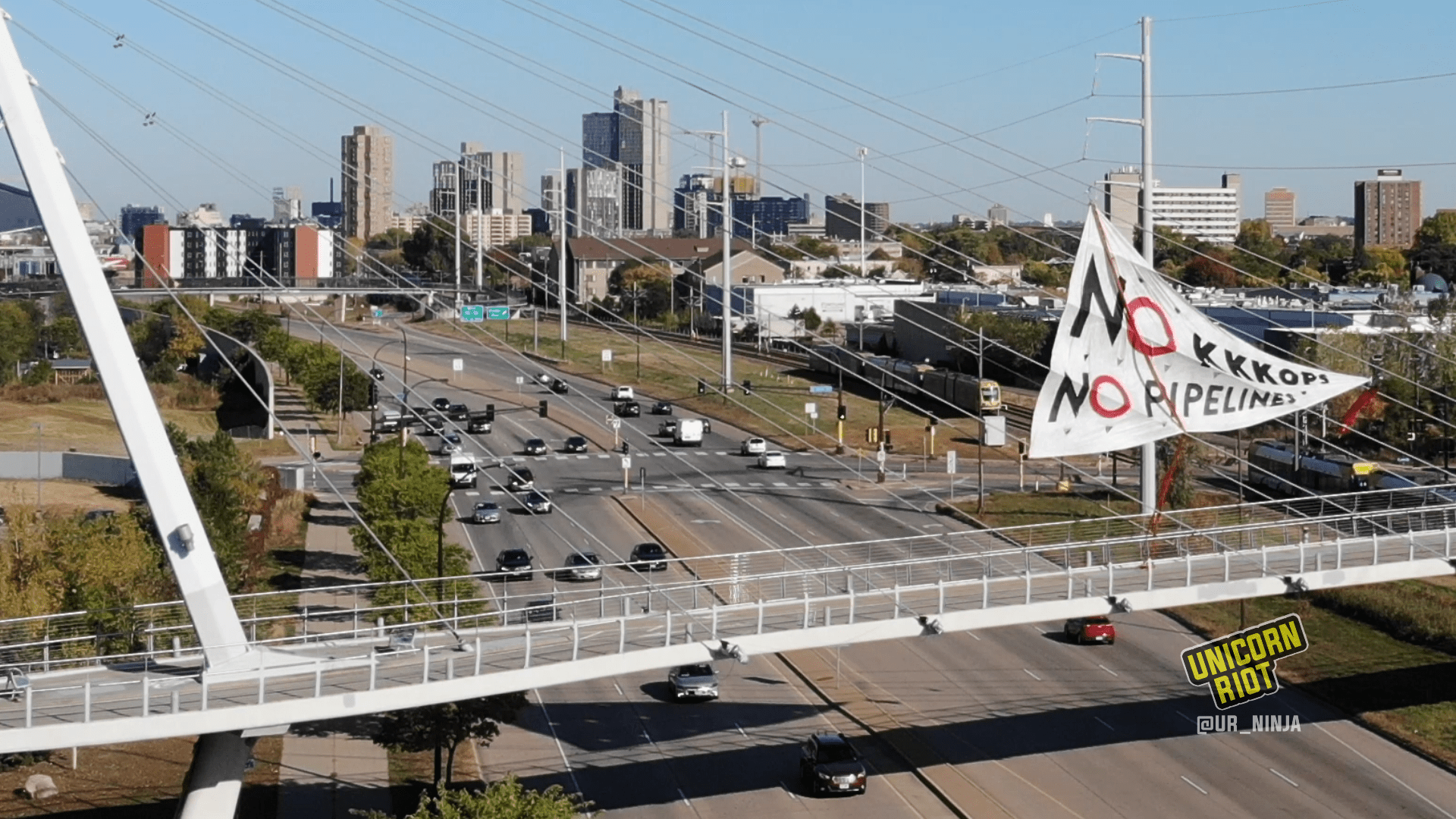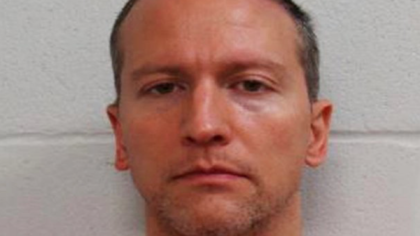‘No KKKops, No Pipelines’ Banner Dropped in Minneapolis
Minneapolis, MN – Activists hoisted a massive banner reading “No KKKops, No Pipelines” above Hiawatha Avenue on Sunday, October 4. More than 20 feet tall, it had been intricately strung from the suspension cables above the Minneapolis Greenway’s pedestrian transit bridge. Sight of the banner was first reported at 9:30 a.m., and it continued flying into the night.
#Minneapolis: protesters hung a banner from bridge over Hiawatha Ave.
We were told the banner was dropped to draw connections btwn #police & the #FossilFuel industry, “working in concert to perpetuate and maintain a ‘law and order’ that is nothing short of genocidal & ecocidal.” pic.twitter.com/6gB48dVJk5
— Unicorn Riot (@UR_Ninja) October 4, 2020
Unicorn Riot obtained a statement from the activists who created and installed the banner, who chose to remain anonymous. They explained that both the composition of the banner, as well as the location itself, were carefully selected “to call attention to the connections between two colonial white supremacist forces.” They identify these two forces as the expanding fossil fuel industry and the police (“KKKops”).
Read below the protesters’ full statement on the banner drop:
StatementActivistBannerDropOctober4Written in all-capital letters on the banner, the two words “No KKKops” are explained in the statement to reference the actions of Minneapolis police in the past year. The second paragraph describes the uprising after the callous and well-publicized police killing of George Floyd “within miles of this bridge,” then condemns the MPD’s role in the city’s violent raids on homeless sanctuary camps this summer. The first to be raided was the Hiawatha/Franklin encampment, claims the statement, “starting at the foot of this bridge.”
“No Pipelines,” the second line of the banner, refers to the expansion of the fossil fuel industry in an era where the devastating effects of climate destabilization are being experienced across the globe. Specifically in Minnesota, protests against Enbridge’s Line 3 tar sands pipeline replacement project have been ongoing for years. While the existing pipeline has been deemed of only limited benefit, the risks of its continued operations are considered serious — particularly of oil contamination of the state’s famed waterways.
More recently, support for the project has been revived by ‘astroturf’ groups such as Minnesotans For Line 3 (M4L3). In contrast to ‘grassroots’ movements built up gradually by and for everyday people, ‘astroturfing‘ involves the manufactured (false) appearance of widespread support for a policy or course of action.
M4L3 signs were on display last year when Unicorn Riot reported from an Indigenous Peoples Day march in Clearwater, MN. Water protectors and allies gathered to march to the Enbridge terminal there, calling attention to the threats tar sands pose to Minnesota’s water and wild rice — both sacred to the Anishinaabeg. Speakers also highlighted the direct link between the fossil fuel industry and missing and murdered Indigenous women and girls (MMIWG). During the water protectors’ march to protect the sacred, handfuls of non-Indigenous counter-protesters flashed M4L3 signs from the side of the road.
On August 3, 2020, several Anishinaabe women gathered at the Mississippi River headwaters in their homelands to collect a pint of water. Since then a “Relay for our Water” has seen the pint ceremonially passed between environmental and faith-based groups across Minnesota, stopping in Minneapolis at the end of September. Enbridge’s Line 3 pipeline is specifically identified as a threat to water on their Facebook event page.
The activists responsible for this Sunday’s banner drop specifically call out the police as a “colonialist white supremacist” institution. Their message was publicized just six weeks prior to the five-year anniversary of the Minneapolis police killing of Jamar Clark.
As we move into the autumn months of 2020, many emergencies are set to intersect at once locally: the housing and rent crisis; deeply embedded race-based inequality and police violence; the continued unpredictable effects of climate destabilization; and Minnesota COVID-19 cases now totaling over 100,000.
“Stop killing us!” implores the activists’ statement. Oil pipelines have a record of leaking, including the Dakota Access line in neighboring states. It is an understatement that the people who live in Minnesota do not need and cannot afford a new emergency, in the form of the contamination of the area’s precious ten thousand lakes.
Follow us on X (aka Twitter), Facebook, YouTube, Vimeo, Instagram, Mastodon, Threads, BlueSky and Patreon.
Please consider a tax-deductible donation to help sustain our horizontally-organized, non-profit media organization:

Unicorn Riot's Line 3 Oil Pipeline Coverage:
- Landing Page for all Unicorn Riot Line 3 Resistance Coverage
- Minnesota Attorney General Keith Ellison Speech Disrupted by Water Protectors - October 8, 2021
- Over 50 Line 3 Pipeline Protesters Arrested Outside MN Governor’s Residence - September 22, 2021
- Police Break Up Ceremony and Indigenous-Led #StopLine3 Occupation - August 31, 2021
- Hundreds March from Governor Residence, Urge Chase Bank Defund Line 3 - August 31, 2021
- First Trial from Treaty People Gathering Ends in Acquittal - August 23, 2021
- Line 3 Opponent Sentenced to Thirty Days in Jail - August 19, 2021
- Enbridge Spills 10,000 Gallons of Line 3 Drilling Fluid - August 16, 2021
- Line 3 Fusion Center Data Declared Secret - August 4, 2021
- Judge Orders Sheriff to Halt Harassment of Line 3 Resistance Camp - July 24, 2021
- Water Protectors Occupy Work Sites and Lock Down to Line 3 Pipeline Construction - July 1, 2021
- Hubbard County Barricades Private Property, Imprisons Water Protectors - June 28, 2021
- Indigenous-Led Blockades Occupy Line 3 Pipeline Sites - June 10, 2021
- Rising Up to the Heat: ‘Treaty People Gathering’ Resists Line 3 Pipeline - June 7, 2021
- Activists Serve Denver Wells Fargo Eviction Notice - May 3, 2021
- Appealing Line 3 Pipeline: Supply and Demand at Root of Hearing - March 23, 2021
- Caravan Disrupts Line 3 Construction Routes, Carlton County Triggers Backlash - March 13, 2021
- Treaty Rights Asserted During Creation of White Earth Camp - March 13, 2021
- 70 Water Protectors Cited, 1 Arrested During Line 3 Commemorative Rally - March 4, 2021
- Bipod and Car Blockade Jam Up Line 3 Construction - March 2, 2021
- Three Lock Down Inside Line 3 Pipeline For 6+ Hours - Feb. 21, 2021
- Lockdown to Keep it in the Ground: Line 3 Resistance - Feb. 15, 2021
- Court of Appeals Denies Motion to Stop Line 3 - Feb. 3, 2021
- Opposition to Line 3 Mounts - Jan. 29, 2021
- Resistance to Line 3: Direct Actions Aim to Stop Construction - Jan. 11, 2021
- Enbridge Line 3 Construction Blocked by Activists in Northern Minnesota - Nov. 18, 2020
- Protests After Permits for Line 3 Oil Pipeline Approved - Nov. 17, 2020
- ‘No KKKops, No Pipelines’ Banner Dropped in Minneapolis - Oct. 6, 2020
- “Divest from Climate Change!” Chase Bank Branch Protested on Opening Day - Nov. 7, 2019
- March to Protect The Sacred on Indigenous People’s Day 2019 - Oct. 14, 2019
- Hundreds Rally in Opposition to Line 3 Tar Sands Pipeline in Minnesota - Sept. 28, 2019
- Direct Action in Minnesota as Line 3 Pipeline Approval Reversed - June 3, 2019
- Multi-Agency Task Force Prepares “Rules of Engagement” For Line 3 Protests - Feb. 11, 2019
- ‘Valve Turners’ Shut Down Enbridge Oil Pipelines in Minnesota - Feb. 4, 2019
- Arts, Culture, and Hip Hop Resist Line 3 as Lawsuits Against Approval Continue - Dec. 29, 2018
- Minnesota Police Train at Military Base as Line 3 Pipeline Protests Escalate - Oct. 25, 2018
- Judge Accepts Water Protectors’ Climate Change Necessity Defense - July 18, 2018
- Line 3 Oil Pipeline Approved By Minnesota Regulators - June 28, 2018
- As Line 3 Oil Pipeline Decision Looms, Indigenous Resistance Increases - June 26, 2018
- Interfaith Community Delivers Letter of Line 3 Opposition to Minnesota Government Offices - June 4, 2018
- Minnesota Public Utilities Commission Requests Line 3 Schedule Change - Jan. 10, 2018
- Rally Against Line 3 Minnesota Pipe Yards - Dec. 11, 2017
- Resistance to Line 3 Pipeline Seeks to Save Sacred Manoomin - Oct. 9, 2017
- Direct Action Ramps Up Resistance to Line 3 - Sept. 18, 2017


